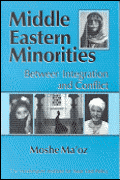While the Arab-Israeli conflict grabs the world’s headlines, beneath the surface in many Middle Eastern countries are simmering ethnic and religious tensions that lack only a lighted fuse to explode. Some of these conflicts are well known to Americans, like the communal struggle among Sunni Kurds, Sunni Arabs, and Shi’i Arabs in Iraq, or he religious-ethnic “warlordism” to which Lebanon descended at the worst of its civil war.
Not all news is bad, through. In Jordan, for example, the Sunni Arab majority has a long history of positive relations with its Christian and Circassian minority. And as other governments from North Africa to Israel begin to see their minority populations as less threatening, inclusiveness–or at least coexistence–seems more attainable.
In this, the Washington Institute’s fiftieth Policy Paper, noted historian Moshe Ma’oz presents a concise survey of majority-minority relations across the Middle East, and considers the potential for conflict arising from religious and ethnic tensions. Middle Eastern Minorities is the starting point for policymakers and scholars committed to understanding and resolving the region’s many conflicts.
Authors
